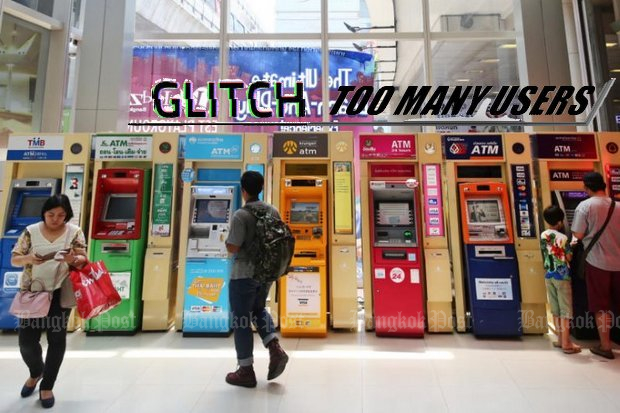
Banks have agreed to double the mobile banking transaction capacity during peak periods by year-end to prevent a future system crash after last week's so-called "technological glitch" that delayed millions of transactions.
The Banking Information Technology Club, an arm of the Thai Bankers' Association (TBA), aims to double capacity for banks' financial transactions and the National Interbank Transaction Management and Exchange Co (ITMX), said club chairman Somkid Jiranuntarat.
These are part of six practical guidelines passed to avoid similar system crashes in the future and to restore customer confidence.
The other guidelines are tightening each bank's internal management system; forming a joint working group between banks and ITMX to specify clear conditions and guidelines for temporarily removing banks from the central system that have a system failure to prevent the problem from affecting other banks; developing a central dashboard to update the status of each bank's system; and informing member banks to ensure timeliness in preparation and problem solving.
Reviewing the design of mobile banking systems and displaying transaction status messages that are clear and easy to understand to avoid confusion are other guidelines.

PromptPay has been heavily promoted by government, but has continuously had both security and technical failures.
ITMX's peak capacity stands at 500 transactions per second. It is the national gateway and switching service provider.
"Although the stronger guidance can't guarantee the system won't be disrupted again, we are doing our best to prevent such problems from happening," Mr Somkid said.
After banks eliminated transaction fees for the digital channel, mobile financial transactions through surged exponentially.
The stricter measures came after banks experienced a "technological glitch" on Aug 31.
What happened on Aug 31
The system crash started at Kasikornbank's (KBank) core switch because of human error on the internal network, disrupting other banks' system and forcing ITMX to remove KBank from the central system, said Mr Somkid, who is also chairman of Kasikorn Business Technology Group, KBank's technology subsidiary.
KBank's problem took place from 6.30am to 11am on Aug 31, and ITMX reconnected the bank's system with other banks later. System crashes, officially called "glitches" by the bankers and affecting other banks after 11.05am did not stem from KBank, he said.
KBank, the country's largest mobile banking service provider by users, had total mobile banking transactions of 5.3 million on Aug 31, bringing the total for the month to 122 million, said Mr Somkid.
The bank can handle 6,000 transactions per second made through K Plus, its mobile banking app.

Peak transactions on Aug 31 stood at 4,000 per second, and the bank plans to increase its capacity to 10,000 per second by the end of this year and 50,000 by 2019, he said.
The capacity expansion is also in preparation for K Plus's new feature, scheduled to be launched next month, though Mr Somkid would not reveal further details.
For KBank's "system glitch" on Sept 1, he said it did not stem from the bank's system, but rather ITMX, which spotted a large number of interbank money transfers from senders providing the wrong account numbers of recipients. ITMX removed KBank from the central system at 10.15am.
The bank shifted to connect with another switching system immediately to allow customers to make money transfers. ITMX reconnected with KBank's system again at 4.11pm, said Mr Somkid.
"KBank affirms our capacity is sufficient. The bank's system crash did not occur for this reason, though the incident reflects that the capacity of some other banks may not be adequate," he said.
The bank plans to spend an additional 1 billion baht on mobile banking system investment, said Mr Somkid.
K Plus had 8.9 million users at the end of July, representing 61% of the bank's total 14.6 million customers and jumping 46% year-on-year.
The number of transactions via K Plus surged 76% year-on-year to 2.7 trillion, with a 42% year-on-year increase in transaction value to 4.8 trillion baht for the seven months through July.
The bank aims for 10.8 million mobile banking users this year, rising 48% from the previous year.